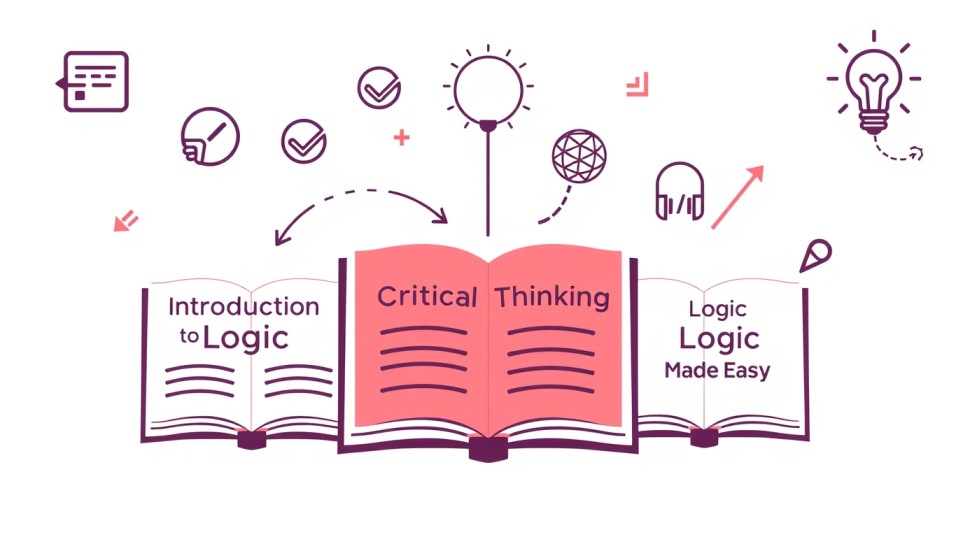If you’ve ever tried to untangle a confusing debate, or even just struggled with a tricky exam question, you already know why logical reasoning matters. It’s not just for philosophers or law students. Logic shows up everywhere—from evaluating news headlines to deciding which argument actually makes sense in a heated discussion with friends.
When I first got interested in logic, I remember being overwhelmed by the sheer number of books out there. Some were too dry, filled with symbols and formal proofs. Others were so basic that I didn’t feel like I was learning much. What I eventually realized is this: the “best” textbook depends on where you’re starting and what you want out of it.
In this guide, I’ll share a few of the most reliable and approachable textbooks for beginners who want to build a foundation in logical reasoning. These aren’t obscure academic texts; they’re books you can actually work through without feeling lost.
Why Use Textbooks in the First Place?
I know, it’s tempting to just rely on YouTube videos or blog posts. And those can help! But textbooks offer a kind of structured path that random online resources don’t.
- They build concepts step by step.
- They include practice problems, which you really need (logic is like math—you learn by doing).
- They’re usually written by experts who know how beginners get stuck, so the explanations anticipate your questions.
That’s why, even in our digital age, textbooks still matter.
1. Introduction to Logic — Irving M. Copi & Carl Cohen
This book is almost legendary. If you ask professors what textbook they used, chances are this one comes up.
Why it’s good:
- It covers both formal logic (symbols, truth tables, etc.) and informal logic (fallacies, everyday arguments).
- It’s thorough but not impossible to follow.
- Tons of practice exercises.
Who it’s for: If you’re serious about really learning logic—maybe you’re in college or just motivated—this book gives you the full toolkit.

2. A Concise Introduction to Logic — Patrick Hurley
If Copi feels a bit heavy, Hurley is your friendlier option. It’s widely used in intro classes because it explains things clearly without drowning you in details.
Highlights:
- Gentle introduction to formal logic.
- Focuses on argument structures, critical thinking, and fallacies.
- Exercises at the end of every chapter.
I like to think of this one as the “gateway” book—it gets you in the door without scaring you off.
3. The Power of Critical Thinking — Lewis Vaughn
Not everyone wants to dive deep into symbolic logic right away. If you’d rather learn how to spot bad arguments in the news or sharpen your reasoning for everyday life, this book is fantastic.
Why it stands out:
- Everyday examples: media, politics, advertising.
- Teaches you how to analyze arguments without jargon.
- More about practical reasoning than formal systems.
If you’ve ever rolled your eyes at a misleading ad or shaky political claim, this book will give you the tools to explain why it doesn’t hold up.
4. Logic Made Easy — Deborah J. Bennett
This one reads more like a popular science book than a textbook, but don’t let that fool you. It’s a clever introduction that sneaks logic into stories and real-life examples.
Good for:
- Casual learners.
- People who get bored with heavy textbooks.
- Anyone curious about logic but not ready for symbolic proofs.
It’s not a replacement for something like Copi or Hurley, but it’s a great companion if you want to see how logic plays out in everyday scenarios.
5. Critical Thinking — William Hughes & Jonathan Lavery
Somewhere between formal and informal, this book bridges the gap. It gives you structure, but it also applies logic to practical reasoning.
Why it works:
- Balanced approach.
- Exercises that actually make you think instead of just memorize.
- Great for self-study if you want a structured path.
This is one of those books that grows with you—you can start as a beginner and still find value in it later.
6. The LSAT Trainer — Mike Kim
I’ll include this one for a specific audience: if your interest in logical reasoning is tied to law school.
The LSAT has an entire section called “Logical Reasoning,” and Mike Kim’s book is one of the best prep tools out there. Even if you’re not taking the exam, it’s surprisingly useful for sharpening argument analysis skills.
So, Which One Should You Pick?
Here’s the short version:
- Want the classic, all-in-one foundation? → Copi & Cohen.
- Want something accessible and student-friendly? → Hurley.
- Want to apply logic to everyday life? → Vaughn or Bennett.
- Want balance with practical exercises? → Hughes & Lavery.
- Prepping for LSAT? → Mike Kim.
Don’t overthink it. Start with one book that matches your goals and stick with it.
Tips for Learning Logical Reasoning
Here’s what I wish I knew when I started:
- Work through the exercises. Reading alone won’t build skill.
- Take it slow. Logic builds on itself; rushing just confuses you.
- Talk it out. Discuss arguments with a friend or study group—it makes ideas click faster.
- Look for logic in real life. Ads, debates, even casual conversations are full of reasoning (and fallacies).
- Review tough spots. Symbols and truth tables might not make sense the first time. That’s normal.

FAQs
1. Do I need a background in math for these textbooks? Not really. Basic algebra helps, but most beginner books focus on reasoning, not heavy math.
2. What’s the best starting book if I’m intimidated by logic? Hurley’s Concise Introduction to Logic is probably the friendliest entry point.
3. Can I teach myself logic with just a textbook? Yes, as long as you actually practice the exercises. Discussion helps too, but it’s not mandatory.
4. Is logical reasoning only useful for exams? No way. It helps in daily decision-making, analyzing arguments, and spotting flawed reasoning.
5. How long does it take to get comfortable with the basics? Give it a couple of months of steady practice and you’ll notice a big difference.
6. Should I read multiple books at once? Better to pick one main book and stick with it. You can add a second for variety if you want.
Final Thoughts
Logical reasoning doesn’t have to be intimidating or boring. With the right textbook, it’s actually pretty rewarding. You start noticing patterns, spotting weak arguments, and thinking more clearly.
If you’re an academic type, Copi or Hurley will give you the full structure. If you’re more of a “real-world” learner, Vaughn and Bennett make logic relatable. And if you’re heading into law, Mike Kim is a lifesaver.
The real key is practice. You don’t learn logic by skimming—you learn it by working through examples, making mistakes, and trying again. Do that, and before long you’ll find yourself thinking in sharper, more structured ways.







